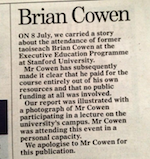 The image is a thumbnail of an apology printed in yesterday’s Irish Mail on Sunday; click through for a full-size twitpic by David Cochrane. It is headed “Brian Cowen”, and it consists of four paragraph. The first paragraph (which consists of a single sentence) begins by referring to their story (update: which is no longer available at this link) of Cowen’s attendance at the Executive Education Programme at Stanford University which has been the subject of two earlier posts (here and here) on this blog, speculating as to the strength of Cowen’s possible complaint to the Press Council of Ireland and the Office of the Press Ombudsman that article invaded his privacy. The Sunday Independent yesterday reported that Cowen’s complaint had indeed been submitted, that it had drawn a robust response from the Irish Mail on Sunday, and that it was being considered by the Press Ombudsman. Where appropriate, the Ombudsman seeks to mediate a resolution to a complaint, and, if the Sunday Independent is right that the matter was before the Ombudsman last week, then this apology may very well be the product of such a mediation process.
The image is a thumbnail of an apology printed in yesterday’s Irish Mail on Sunday; click through for a full-size twitpic by David Cochrane. It is headed “Brian Cowen”, and it consists of four paragraph. The first paragraph (which consists of a single sentence) begins by referring to their story (update: which is no longer available at this link) of Cowen’s attendance at the Executive Education Programme at Stanford University which has been the subject of two earlier posts (here and here) on this blog, speculating as to the strength of Cowen’s possible complaint to the Press Council of Ireland and the Office of the Press Ombudsman that article invaded his privacy. The Sunday Independent yesterday reported that Cowen’s complaint had indeed been submitted, that it had drawn a robust response from the Irish Mail on Sunday, and that it was being considered by the Press Ombudsman. Where appropriate, the Ombudsman seeks to mediate a resolution to a complaint, and, if the Sunday Independent is right that the matter was before the Ombudsman last week, then this apology may very well be the product of such a mediation process.
The second paragraph in the apology (which also consists of a single sentence) says that Cowen has made it clear that he paid for the course entirely out of his own resources. The original article had said that “Stanford had hosted 60 chief executives from Irish IT and life science companies under the Enterprise Ireland leadership for growth programme, all subsidised by the Irish taxpayer”. This, of course, led to speculation about whether EI were funding Cowen’s course, and although it was quickly made clear that he was funding the course himself, the implication must clearly have rankled with Cowen. However, any complaint about this aspect of the Mail’s article is one as to the accuracy of the piece, rather than as to whether it had invaded Cowen’s privacy.
The third paragraph in the apology consists of two sentences, one of which says that the report was illustrated with a photograph of Cowen at a lecture, and the other of which says that Cowen had attended the course in a private capacity. Unlike in the previous paragraph, the issues in this paragraph are indeed related to privacy, and formed the basis of the discussion between Jonathan McCully and myself. I was strongly of the view that Cowen is still a public figure, that this course built on his time as a public figure with a view to his possible return to public life, and that the public interest justified publication not only of the story but also of the accompanying photographs. Jonathan equally strongly took the other line, that Cowen no longer holds public office or follows a public career, that the photographs of Cowen on a private campus, at lunch, and in class, were essentially of a private nature, and that there was no public interest in publishing either the article or the photographs. Nevertheless, whilst I think it interesting that the apology only refers to one of the photographs, rather than to all of them, given that the Mail has published an apology, Jonathan’s analysis must have been closer to the mark.
The fourth paragraph, which also consists of a single sentence, provides
We apologise to Mr Cowen for this publication.
The apology does not seem to be available online, but the original story (without any correction or apology) still is has been deleted. It seems that, despite the apology, I will always know what you did last Summer, Mr Cowen, but there are now question-marks over just how much of what I know invaded your privacy.
One Reply to “I will always know what you did last Summer, Mr Cowen”